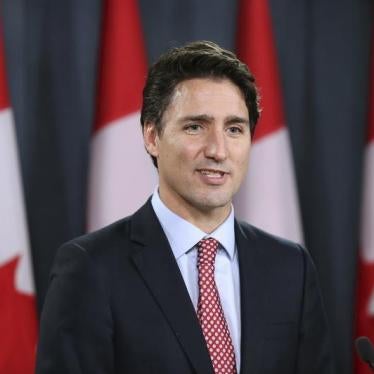This spring, First Nations in northern Ontario are facing another challenging hunting season. Charles Hookimaw, lands and resources director at Attawapiskat First Nation, told us that warmer, wetter weather culminating in an early spring melt made it harder to safely cross the river to hunt geese during their spring migration. That means bringing home fewer geese for himself, family, and community members unable to hunt.
Like many First Nations, Attawapiskat maintains a strong traditional food sharing network, but climate change impacts—like early melts—are creating new obstacles to food security.
With Budget 2021, the Canadian government has taken positive steps to protect the right to food for communities like Attawapiskat. In a first for a federal budget, the government allotted funds—$22.7 million over five years—to support First Nations and Inuit to manage climate impacts on health, including on access to traditional food.
The budget also earmarks $164 million to expand Nutrition North Canada, the federal food subsidy program for remote northern communities, a $100 million increase from the last commitment in 2016.
These are much needed supports for First Nations, for whom climate change is making it increasingly difficult and dangerous to get healthy, nutritious food, exacerbating already high food insecurity tied to historic marginalization and the impacts of colonialism.
If remote First Nations members can’t harvest enough food, their only option is to buy costly imported food. But high prices coupled with low average incomes make that unaffordable in remote communities. In Attawapiskat, for example, a family of four would have to spend almost half their monthly budget to buy healthy food, compared to 17.4 percent for a family in Toronto.
How Budget 2021 is implemented could make all the difference. Nutrition North has failed to deliver affordable food prices through its transport subsidy. Increased funding provides the opportunity to build on new initiatives like the Harvesters Support Grant to support traditional harvesting and community-led solutions. With only three years of promised funding, however, it is unclear whether program changes will be sustainable.
Other funding gaps also remain. Budget 2021 didn’t follow-up on the Trudeau government’s commitment to develop a National School Food Program, a key opportunity to help address First Nations childhood food insecurity.
Canada also needs to step up efforts to prevent worse climate impacts by reducing emissions. While Canada recently committed to reach a 40-45 percent reduction by 2030, this is a far cry from the 60 percent reduction environmental groups say is needed. For now, Canada, warming at twice the global rate, will need even more investment to address climate impacts on Indigenous food security.
Hookimaw, meanwhile, will keep fighting for his community’s rights. “For us, going out [on the land] is survival, feeding our family and friends,” he told us. “We’re going to keep finding ways to help families be out there.”







